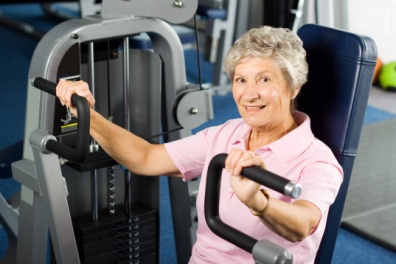SIZE
How to manage your weight healthily on your own or at a senior living community
If you are like many people and trying to lose a few pounds, you might take comfort in knowing you have plenty of company. More than 100 million American—nearly half of those age 20 and over—try to lose weight each year.
Unfortunately, though, only one in six overweight Americans actually loses weight and keeps it off, according to Penn State College of Medicine researchers in Hershey.
And, as you age, losing weight can become more difficult—but that doesn’t mean you should give up on the idea. Extra weight can increase your risk of cancer, diabetes and heart disease. Even modest weight reduction can positively affect your health. For example, American Dietetic Association research shows a 5-10 percent weight loss can considerably lower blood pressure and cholesterol if you carry extra weight.
Eating right and moving right are vital to your weight management plans
But first things first: before beginning a change in your diet or a fitness program, talk with your physician. This is even more important if you have a chronic medical condition, say, diabetes or high blood pressure. Your doctor will want to be sure your exercise regimen is safe and your diet is healthy and effective. (Some popular diets are not.)
Because calorie needs decline with age, you may not have to eat as much as when you were younger. According to the physician-supervised website VeryWell.com, senior women generally need 1,600-2,200 daily calories, depending on their level of activity. Senior men need 2,000-2,800 calories. It’s vital, then, that most calories come from nutritious foods that satisfy daily dietary requirements.
Here are some healthy dietary tips regardless of your weight-management plan:
- Eat protein—lean meats, poultry, fish, eggs and legumes (e.g., beans, lentils and chick peas).
- Drink water rather than high-calorie sodas and juices. Coffee and tea are fine as well.
- When you eat, first fill half of your plate with vegetables (preferably raw or steamed) and the rest with equal parts protein and starches not high in fat (most rice, pasta, grains and potatoes).
For exercise, walking can be the best option for seniors, but some are able to swim or bike as well. In addition, weight training can help increase muscle mass and reduce fat.
Bear in mind that if your goal is to maintain a constant, desirable weight, that will mean a long-term commitment to lifestyle changes.
Ecumenical, your Harrisburg senior living community and partner in health
At Ecumenical Retirement Community, we know weight management is important to preserve good health. If residents are overweight and motivated to slim down a bit, we support them and suggest they first talk with a physician. We also work with them on their dietary needs, offer heart healthy options in our new menus and encourage their participation in one of our on-campus fitness programs. That’s what the best retirement communities do—partner with their residents to safeguard and manage their health.
If you are looking for a senior living community near you, we invite you to contact us at Ecumenical Retirement Community in Harrisburg, PA. The staff at Ecumenical enjoys working with our residents to support them in remaining healthy, fit and active. We would be glad to have you visit our senior living community and introduce you to our full range of services.
Categories:
- All
- Alzheimer's
- Assisted Living
- Blood Drive
- car wash
- caregiver
- christmas
- Community Blood Drive
- community event
- Comparing Retirement Community Costs
- Dance
- dementia
- dining
- donate
- donations
- easter
- easter bunny
- easter egg hunt
- ecumenical
- exercise
- fall prevention for seniors
- family
- Family Community Event
- For Adult Children
- grace
- Grandparents Day
- health
- holiday season
- Holidays
- Independent Living
- Kids Event
- Memory Care
- moving to a retirement community
- Personal Care
- pets
- retirement community
- retirement home
- Safety
- social activities
- the longest day
- tree lighting
- trial stay
- V Day
- winter

